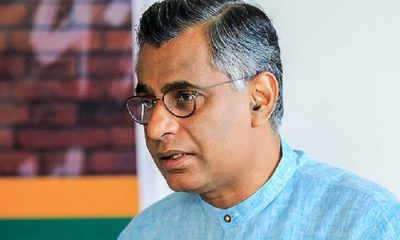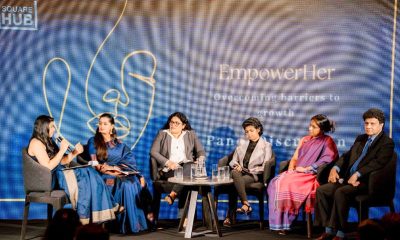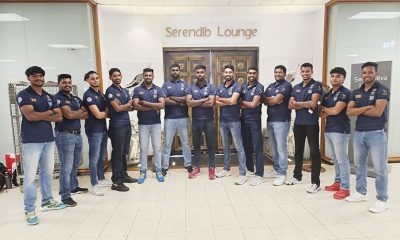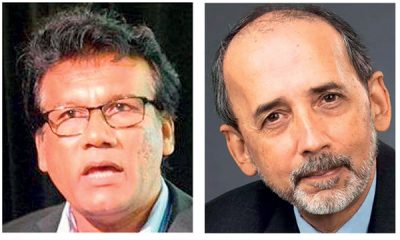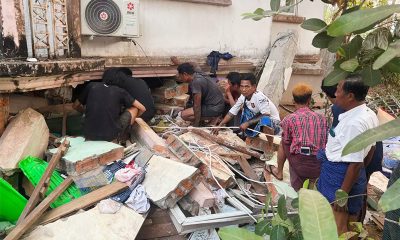Features
We should get ready

By Praying Mantis
This piece is all about getting ready for elections. God forbid… no, no, no and no… not the insignificant as well as totally worthless Local Government and Provincial Government Elections. It is all about the elections that really matter; the Presidential Election and the General Election, which are due in a few years’ time. Many who read this article may think that I need to have my head examined as there are over two years for those elections. But the truth is that although the said elections are way off, we need to contemplate the way to go from now itself. We simply have to reflect on what has happened over the last few decades and what the contenders are offering for the future. It is not a secret that all of them, without any exceptions, would be offering the moon and the earth to the inhabitants of this island which is said to be a land like no other. Of course, the million-dollar question is whether we believe them.
Sri Lankans are notorious for their extremely short memories. In such a scenario, all of what we are being put through now are likely to be forgotten in a few months, leave alone a couple of years. Yes…, I said ‘put through’ because, all except perhaps the henchmen and the people who control the statute, are being put through a wringer so as to extract the last drops of peaceful, happy existence in this country. When election time comes, the political dregs of all hues that we have around, will start to shout again even from the rooftops promising us milk, honey, prosperity, wealth, splendid governance, superb health and even everything else that is really nice. The gullible public will most conveniently not remember the partisanships, the hardships, the corruption, the lawlessness and everything else that is contemptible, that has gone under the bridge during these terrible times. The farmers, agriculturists, importers, villagers and workers of all sorts will listen to the rhetoric, the false promises and the lies of these miserable legislators and will cheerfully go and vote for the villains of the piece of the last couple of decades.
The populace of this country should take note of the perpetual and unbelievably cunning ways in which politicians continue to dupe them. When they are in power, “you scratch my back and I will scratch yours” mentality and camaraderie amongst all politicians of many different colours and loyalties is there for all to see; perhaps a classic example of unity in diversity. Even the suspected and even proven miscreants are not put behind bars. One lot in power will never take steps to jail people from other camps. That is because of the lingering fear that if and when roles are reversed, then they would be paid back with interest. The only politician who was put behind bars in recent years was just the person who wagged his uncontrollable tongue at the judiciary. The judicial machinery got into gear ever so rapidly and the guy was made to pay the price. Yet for all that, some of the others who were accused of various crimes, even far more serious ones, and well known to be the perpetrators of all of them, have not even been brought before the judiciary by the law enforcement agencies.
It is not at all common for politicians to admit their faults and mistakes. We have hardly ever, if not never, seen the spectacle of a politician saying mea culpa, mea culpa, mea maxima culpa. Even in the face of an indefensible faux pas, they will try their best to wriggle out and abrogate responsibility for the entire fiasco to others. On reflection, it is impossible to find a political party or a politician graceful enough to admit their past mistakes. If we can find even one, then pigs will fly. All political parties in the country today, without any exceptions whatsoever, are guilty of various types of wrongdoings and misdemeanours, in the not-too-distant past, some even to the extent of endangering democracy and our beloved motherland itself.
A case in point is the present Janatha Vimukthi Peramuna (JVP) set. If we are to take their current policies and pontifications at face-value, they are quite reasonable; in fact, just what we need. They promise a whole lot of progressive manoeuvres, together with promises of firmly dealing with political miscreants and scoundrels of the past. They are the only people who seem to have been able to provide verbal fireworks of a kind of devastating type in our Parliament. However, can we trust them? Perhaps not, as there is no guarantee that they will be any different once they get power into their hands. It is said that power corrupts and absolute power corrupts absolutely. The current band of sahodarayas or comrades of the JVP have not had the guts to come out and say that they made mistakes from the early seventies of the last century. They caused mayhem and threatened even the very existence of law and order on more than one occasion. They have not even bothered to come before the people, admit their past mistakes and apologise to the countrymen and countrywomen of our Motherland for all types of transgressions that they have inflicted on this country. They do not seem to realise that if they come clean in all honesty, the populace might; just might start to think, ‘OK, they made mistakes and they have the courage to admit them, let us give them a chance’. If they listen to reason, the sahodarayas and the sahodariyas will do just that. Then, and only then, will they stand head and shoulders above the rest of them all. The government-backed newspapers brand them as a spent old force but if they show up with honesty and a genuine desire to make a change for the better, egg and stone attacks notwithstanding, all other political parties will learn a really bitter lesson. It is also most important for them to come forward as a single unified party and not be a part of a coalition or a ‘sandhanaya’. This writer hopes that the likes of the prince, Vijitha, T-win, Lal the kantha, Bee-mal, h-rini, Sunil the handun …., together with a conglomerate of assorted comrades would take these random musings seriously. They must realise that our people have tried all other so-called front-runner parties and are sick to their back teeth with them. They will not think twice about trying out another novel lot. So, keep that firmly in your mind JVP, if you really want to get anywhere in this rat race.
Then of course there is the daasa guy from the opposing force who routinely shouts at a pretty high decibel level even when he has to convey something that is not of vital importance to the people. I do not think he realises that the sound level is not the thing that makes an impact, except on our eardrums. It is the substance that is vocalised that is of the essence. He should perhaps learn a lesson from a very prominent and very senior member of the powerful ‘clan’ who even when he held the highest position of the land, never raised his voice. He would speak most attractively and really modulate his voice as a part and parcel of his charismatic personality. In addition to the connotations on the sound level, the lot in that party of daasa are promising various types of corrections they would take to counteract the misguided and disastrous steps taken by the current lot in power. Of course, they do not mince their words and are on an attack mode all the time, with the ear-splitting voice blaring at the highest pitch. However, they and their affiliated colleagues have also promised all kinds of things in the past but their performance record is rather abysmal. Their henchmen too have tremendously benefited from all kinds of crafty manoeuvres and even blatant scams in the past. They too have not had the courage to ever come before the people and admit their mistakes. They probably think it is infra dig, but the truth is that the general public hold them responsible for all those misdemeanours and transgressions.
Then there is a cluster of other little lots of also-ran types who are not even worth bothering about. There are the likes of dehydrated pumpkins, the overfed rounded ones, the old man with dubious tendencies, the contingent of believers in extremism as well as fanaticism, and all kinds of we-are-also-there types. They are thoroughbred nincompoops and ignoramuses.
Judge all of our politicians and every single one of them by what they have promised in the past and what they have delivered; by what they have said they will do and what they have actually done and whether they are empathetic to their country-people or whether they have been the nasty vultures that sucked the life blood of the populace for personal benefits and those of their hangers-on. Did they pamper to the whims and fancies of their henchmen, even if those worthies were going against all that is decent and lawful? Most unfortunately and quite sadly, the answer is in the affirmative in the case of the majority of our legislators.
Niccolò Machiavelli is deemed to be the representative par excellence of the lack of morality and ethics in politics. The theory that ‘the end justifies the means’ encapsulates his political and moral thought. The popular conception is that Machiavelli’s political methods are amoral, evil, but yet perhaps rational and pragmatic in a perverse sort of way. It was advice like “It is necessary for a prince wishing to hold his own to know how to do wrong”, offered by Niccolò Machiavelli in The Prince, that made its author’s name synonymous with the ruthless use of power.
It was John Fitzgerald Kennedy, the iconic President of the United States of America, who came out with the oft quoted line in his 1961 Inaugural Address “My fellow Americans: ask not what your country can do for you—ask what you can do for your country“. We should constantly remind our set of politicians of all hues that the same sentiments apply equally well to them as far as what they can do for our beautiful country and certainly not what our Motherland could do for them.
Features
Celebrating 25 Years of Excellence: The Silver Jubilee of SLIIT – II

 Founded in 1999, with its main campus in Malabe and multiple centres across the country—including Metro Campus (Colombo), Matara, Kurunegala, Kandy (Pallekele), and Jaffna (Northern Uni)—SLIIT provides state-of-the-art facilities for students, now celebrating 25 years of excellence in 2025.
Founded in 1999, with its main campus in Malabe and multiple centres across the country—including Metro Campus (Colombo), Matara, Kurunegala, Kandy (Pallekele), and Jaffna (Northern Uni)—SLIIT provides state-of-the-art facilities for students, now celebrating 25 years of excellence in 2025.
Kandy Campus
SLIIT is a degree-awarding higher education institute authorised and approved by the University Grants Commission (UGC) and Ministry of Higher Education under the University Act of the Government of Sri Lanka. SLIIT is also the first Sri Lankan institute accredited by the Institution of Engineering & Technology, UK. Further, SLIIT is also a member of the Association of Commonwealth Universities (ACU) and the International Association of Universities (IAU).
Founded in 1999, with its main campus in Malabe and multiple centres across the country—including Metro Campus (Colombo), Matara, Kurunegala, Kandy (Pallekele), and Jaffna (Northern Uni)—SLIIT provides state-of-the-art facilities for students, now celebrating 25 years of excellence in 2025.
Since its inception, SLIIT has played a pivotal role in shaping the technological and educational landscape of Sri Lanka, producing graduates who have excelled in both local and global arenas. This milestone is a testament to the institution’s unwavering commitment to academic excellence, research, and industry collaboration.
Summary of SLIIT’s
History and Status
Sri Lanka Institute of Information Technology (SLIIT) operates as a company limited by guarantee, meaning it has no shareholders and reinvests all surpluses into academic and institutional development.
* Independence from Government: SLIIT was established in 1999 as an independent entity without government ownership or funding, apart from an initial industry promotion grant from the Board of Investment (BOI).
* Mahapola Trust Fund Involvement & Malabe Campus: In 2000, the Mahapola Trust Fund (MTF) agreed to support SLIIT with funding and land for the Malabe Campus. In 2015, SLIIT fully repaid MTF with interest, ending financial ties.
* True Independence (2017-Present): In 2017, SLIIT was officially delisted from any government ministry, reaffirming its status as a self-sustaining, non-state higher education institution.
Today, SLIIT is recognised for academic excellence, global collaborations, and its role in producing IT professionals in Sri Lanka
.A Journey of Growth and Innovation
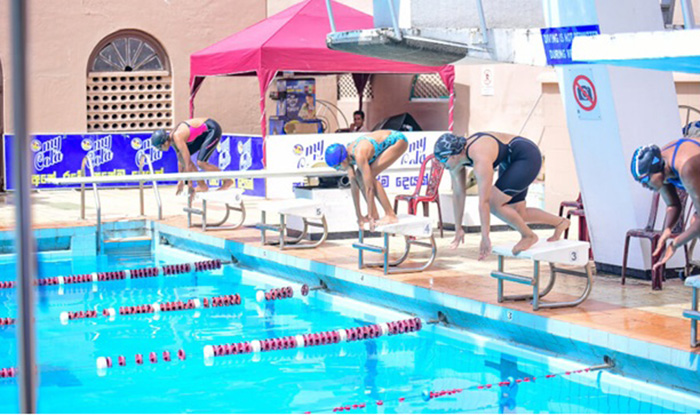
SLIIT began as a pioneering institution dedicated to advancing information technology education in Sri Lanka. Over the past two and a half decades, it has expanded its academic offerings, establishing itself as a multidisciplinary university with programmess in engineering, business, architecture, and humanities, in addition to IT. The growth of SLIIT has been marked by continuous improvement in infrastructure, faculty development, and curriculum enhancement, ensuring that students receive world-class education aligned with industry needs.
Looking Ahead: The Next 25 Years
As SLIIT celebrates its Silver Jubilee, the institution looks forward to the future with a renewed commitment to excellence. With advancements in technology, the rise of artificial intelligence, and the increasing demand for skilled professionals, SLIIT aims to further expand its academic offerings, enhance research capabilities, and continue fostering a culture of innovation. The next 25 years promise to be even more transformative, as the university aspires to make greater contributions to national and global progress.
Sports Achievements:
A Legacy of Excellence
SLIIT has not only excelled in academics but has also built a strong reputation in sports. Over the years, the university has actively promoted athletics and competitive sports by organising inter-university and inter-school competitions, fostering a culture of teamwork, discipline, and resilience. SLIIT teams have secured victories in national and inter-university competitions across various sports, including cricket, basketball, badminton, rugby, football, swimming, and athletics. SLIIT’s sports achievements reflect its dedication to holistic student development, encouraging students to excel beyond the classroom.
Kings of the pool!
Once again, our swimmers have brought glory to SLIIT by emerging as champions at the Asia Pacific Institute of Information and Technology Extravaganza Swimming Championship 2024. They won the Men’s, Women’s, and Overall Championships. Congratulations to all swimmers for their dedication and hard work in the pool, bringing honour to SLIIT.
Winning International Competitions
SLIIT students have participated in and excelled in various international competitions, including Robofest, Codefest, and the University of Queensland – Design Solution for Impact Competition, showcasing their skills and talent on a global stage.
Here’s a more detailed look at SLIIT’s involvement in international competitions:
Robofest:
SLIIT’s Faculty of Engineering organises the annual Robofest competition, which aims to empower students with skills in electronics, robotics, critical thinking, and problem-solving, preparing them to compete internationally and bring recognition to Sri Lankan talent.
Codefest:
CODEFEST is a nationwide Software Competition organized by the Faculty of Computing of Sri Lanka Institute of Information Technology (SLIIT) geared towards exhibiting the software application design and developing talents of students island-wide. It is an effort of SLIIT to elevate the entire nation’s ICT knowledge to achieve its aspiration of being the knowledge hub in Asia. CODEFEST was first organised in 2012 and this year it will be held for the 8th consecutive time in parallel with the 20th anniversary celebrations of SLIIT.
University of Queensland – Design Solution for Impact Competition:
SLIIT hosted the first-ever University of Queensland – Design Solution for Impact Competition in Sri Lanka, with 16 school teams from across the country participating.
International Open Day:
SLIIT organises an International Open Day where students can connect with distinguished lecturers and university representatives from prestigious institutions like the University of Queensland, Liverpool John Moores University, and Manchester Metropolitan University.
Brain Busters:
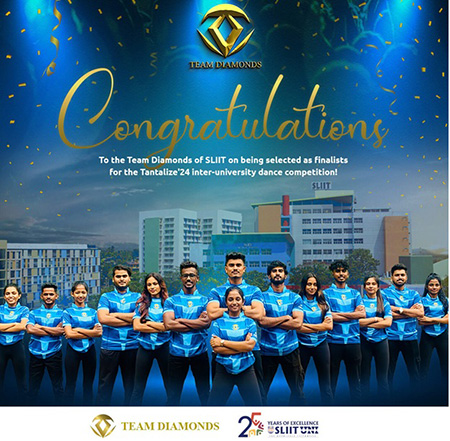
SLIIT Brain Busters is a quiz competition organised by SLIIT. The competition is open to students of National, Private and International Schools Island wide. The programme is broadcast on TV1 television as a series.
Inter-University Dance Competition:
SLIIT Team Diamonds for being selected as finalists and advancing to the Grand Finale of Tantalize 2024, the inter-university dance competition organised by APIIT Sri Lanka. The 14 talented team members from various SLIIT faculties have showcased their skills in Team Diamonds and earned their spot as finalists, competing among over 30 teams from state universities, private universities, and higher education institutes.
Softskills+
For the 11th consecutive year, Softskills+ returns with an exciting lineup of events aimed at honing essential soft skills among students. The program encompasses an interschool quiz contest and a comprehensive workshop focused on developing teamwork, problem-solving abilities, leadership qualities, and fostering creative thinking.
Recently, the Faculty of Business at SLIIT organised its annual Inter-school Quiz Competition and Soft Skills Workshop, marking its fifth successive year. Targeting students in grades 11 to 13 from Commerce streams across State, Private, and International schools, the workshop sought to ignite a passion for soft skills development, emphasising teamwork, problem-solving, creativity, and innovative thinking. Recognising the increasing importance of these soft skills in today’s workforce, the programme aims to fill the gap often left unaddressed in the school curriculum.”
The winners of the soft skill competition with Professor Lakshman Rathnayake: Chairman/Chancellor, Vice Chancellor/MD Professor Lalith Gamage, Professor Nimal Rajapakse: Senior Deputy Vice – Chancellor & Provost, Deputy Vice Chancellor – Research and International Affairs Professor Samantha Thelijjagoda, and Veteran Film Director Somarathna Dissanayake.
VogueFest 2024:
SLIIT Business School organised VogueFest 2024, a platform for emerging fashion designers under 30 to showcase their work and win prizes.
T-shirt Design Competition with Sheffield Hallam University:
SLIIT and Sheffield Hallam University (SHU) UK collaborated on a T-shirt designing competition, with a voting procedure to select the best design.
SLIIT’s Got Talent
: The annual talent show, SLIIT’s Got Talent 2024, was held for the 10th consecutive year at the Nelum Pokuna Mahinda Rajapaksa Theatre on 27th September 2024. SLIIT’s Got Talent had the audience energised with amazing performances, showcasing mind-blowing talent by the orchestra and the talented undergraduates from all faculties.
Other events:
* SLIIT also participates in events like the EDUVision Exhibition organised by the Richmond College Old Boys’ Association.
* They hosted the first-ever University of Queensland – Design Solution for Impact Competition in Sri Lanka.
* SLIIT Business School also organised the Business Proposal Competition.
SLIIT Academy:
SLIIT Academy (Pvt.) Ltd. provides industrial-oriented learning experiences for students.
International Partnerships:
SLIIT has strong international partnerships with universities like Liverpool John Moores University (LJMU), The University of Queensland (UQ), Manchester Metropolitan University (MMU), and Curtin University Australia, providing opportunities for students to study and participate in international events.
(The writer, a senior Chartered Accountant and professional banker, is Professor at SLIIT University, Malabe. He is also the author of the “Doing Social Research and Publishing Results”, a Springer publication (Singapore), and “Samaja Gaveshakaya (in Sinhala).
Features
Inescapable need to deal with the past
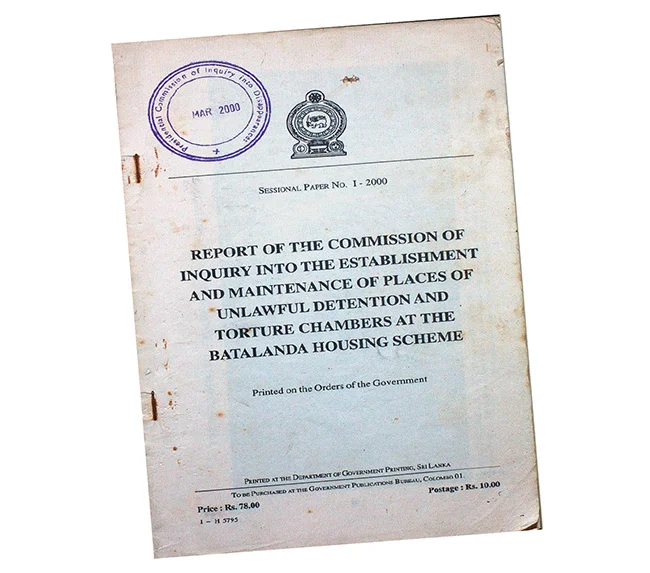
The sudden reemergence of two major incidents from the past, that had become peripheral to the concerns of people today, has jolted the national polity and come to its centre stage. These are the interview by former president Ranil Wickremesinghe with the Al Jazeera television station that elicited the Batalanda issue and now the sanctioning of three former military commanders of the Sri Lankan armed forces and an LTTE commander, who switched sides and joined the government. The key lesson that these two incidents give is that allegations of mass crimes, whether they arise nationally or internationally, have to be dealt with at some time or the other. If they are not, they continue to fester beneath the surface until they rise again in a most unexpected way and when they may be more difficult to deal with.
In the case of the Batalanda interrogation site, the sudden reemergence of issues that seemed buried in the past has given rise to conjecture. The Batalanda issue, which goes back 37 years, was never totally off the radar. But after the last of the commission reports of the JVP period had been published over two decades ago, this matter was no longer at the forefront of public consciousness. Most of those in the younger generations who were too young to know what happened at that time, or born afterwards, would scarcely have any idea of what happened at Batalanda. But once the issue of human rights violations surfaced on Al Jazeera television they have come to occupy centre stage. From the day the former president gave his fateful interview there are commentaries on it both in the mainstream media and on social media.
There seems to be a sustained effort to keep the issue alive. The issues of Batalanda provide good fodder to politicians who are campaigning for election at the forthcoming Local Government elections on May 6. It is notable that the publicity on what transpired at Batalanda provides a way in which the outcome of the forthcoming local government elections in the worst affected parts of the country may be swayed. The problem is that the main contesting political parties are liable to be accused of participation in the JVP insurrection or its suppression or both. This may account for the widening of the scope of the allegations to include other sites such as Matale.
POLITICAL IMPERATIVES
The emergence at this time of the human rights violations and war crimes that took place during the LTTE war have their own political reasons, though these are external. The pursuit of truth and accountability must be universal and free from political motivations. Justice cannot be applied selectively. While human rights violations and war crimes call for universal standards that are applicable to all including those being committed at this time in Gaza and Ukraine, political imperatives influence what is surfaced. The sanctioning of the four military commanders by the UK government has been justified by the UK government minister concerned as being the fulfilment of an election pledge that he had made to his constituents. It is notable that the countries at the forefront of justice for Sri Lanka have large Tamil Diasporas that act as vote banks. It usually takes long time to prosecute human rights violations internationally whether it be in South America or East Timor and diasporas have the staying power and resources to keep going on.
In its response to the sanctions placed on the military commanders, the government’s position is that such unilateral decisions by foreign government are not helpful and complicate the task of national reconciliation. It has faced criticism for its restrained response, with some expecting a more forceful rebuttal against the international community. However, the NPP government is not the first to have had to face such problems. The sanctioning of military commanders and even of former presidents has taken place during the periods of previous governments. One of the former commanders who has been sanctioned by the UK government at this time was also sanctioned by the US government in 2020. This was followed by the Canadian government which sanctioned two former presidents in 2023. Neither of the two governments in power at that time took visibly stronger stands.
In addition, resolutions on Sri Lanka have been a regular occurrence and have been passed over the Sri Lankan government’s opposition since 2012. Apart from the very first vote that took place in 2009 when the government promised to take necessary action to deal with the human rights violations of the past, and won that vote, the government has lost every succeeding vote with the margins of defeat becoming bigger and bigger. This process has now culminated in an evidence gathering unit being set up in Geneva to collect evidence of human rights violations in Sri Lanka that is on offer to international governments to use. This is not a safe situation for Sri Lankan leaders to be in as they can be taken before international courts in foreign countries. It is important for Sri Lanka’s sovereignty and dignity as a country that this trend comes to an end.
COMPREHENSIVE SOLUTION
A peaceful future for Sri Lanka requires a multi-dimensional approach that addresses the root causes of conflict while fostering reconciliation, justice, and inclusive development. So far the government’s response to the international pressures is to indicate that it will strengthen the internal mechanisms already in place like the Office on Missing Persons and in addition to set up a truth and reconciliation commission. The difficulty that the government will face is to obtain a national consensus behind this truth and reconciliation commission. Tamil parties and victims’ groups in particular have voiced scepticism about the value of this mechanism. They have seen commissions come and commissions go. Sinhalese nationalist parties are also highly critical of the need for such commissions. As the Nawaz Commission appointed to identify the recommendations of previous commissions observed, “Our island nation has had a surfeit of commissions. Many witnesses who testified before this commission narrated their disappointment of going before previous commissions and achieving nothing in return.”
Former minister Prof G L Peiris has written a detailed critique of the proposed truth and reconciliation law that the previous government prepared but did not present to parliament.
In his critique, Prof Peiris had drawn from the South African truth and reconciliation commission which is the best known and most thoroughly implemented one in the world. He points out that the South African commission had a mandate to cover the entire country and not only some parts of it like the Sri Lankan law proposes. The need for a Sri Lankan truth and reconciliation commission to cover the entire country and not only the north and east is clear in the reemergence of the Batalanda issue. Serious human rights violations have occurred in all parts of the country, and to those from all ethnic and religious communities, and not only in the north and east.
Dealing with the past can only be successful in the context of a “system change” in which there is mutual agreement about the future. The longer this is delayed, the more scepticism will grow among victims and the broader public about the government’s commitment to a solution. The important feature of the South African commission was that it was part of a larger political process aimed to build national consensus through a long and strenuous process of consultations. The ultimate goal of the South African reconciliation process was a comprehensive political settlement that included power-sharing between racial groups and accountability measures that facilitated healing for all sides. If Sri Lanka is to achieve genuine reconciliation, it is necessary to learn from these experiences and take decisive steps to address past injustices in a manner that fosters lasting national unity. A peaceful Sri Lanka is possible if the government, opposition and people commit to truth, justice and inclusivity.
by Jehan Perera
Features
Unleashing Minds: From oppression to liberation
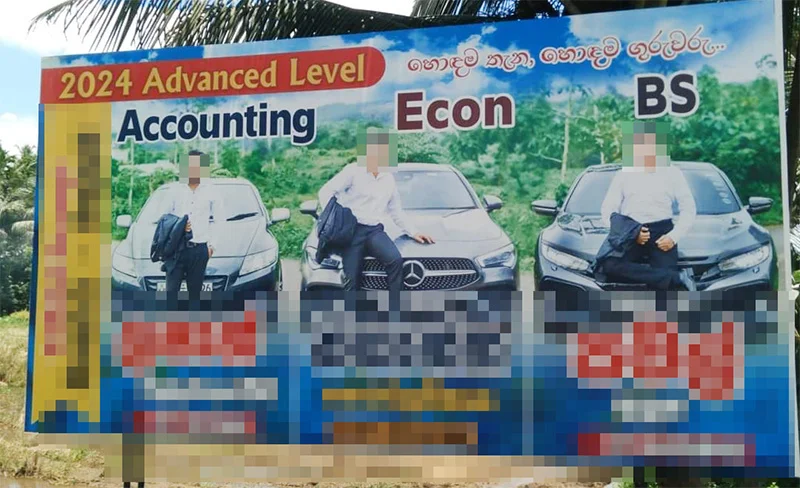
 Education should be genuinely ‘free’—not just in the sense of being free from privatisation, but also in a way that empowers students by freeing them from oppressive structures. It should provide them with the knowledge and tools necessary to think critically, question the status quo, and ultimately liberate themselves from oppressive systems.
Education should be genuinely ‘free’—not just in the sense of being free from privatisation, but also in a way that empowers students by freeing them from oppressive structures. It should provide them with the knowledge and tools necessary to think critically, question the status quo, and ultimately liberate themselves from oppressive systems.
Education as an oppressive structure
Education should empower students to think critically, challenge oppression, and envision a more just and equal world. However, in its current state, education often operates as a mechanism of oppression rather than liberation. Instead of fostering independent thinking and change, the education system tends to reinforce the existing power dynamics and social hierarchies. It often upholds the status quo by teaching conformity and compliance rather than critical inquiry and transformation. This results in the reproduction of various inequalities, including economic, racial, and social disparities, further entrenching divisions within society. As a result, instead of being a force for personal and societal empowerment, education inadvertently perpetuates the very systems that contribute to injustice and inequality.
Education sustaining the class structure
Due to the widespread privatisation of education, the system continues to reinforce and sustain existing class structures. Private tuition centres, private schools, and institutions offering degree programmes for a fee all play a significant role in deepening the disparities between different social classes. These private entities often cater to the more affluent segments of society, granting them access to superior education and resources. In contrast, students from less privileged backgrounds are left with fewer opportunities and limited access to quality education, exacerbating the divide between the wealthy and the underprivileged. This growing gap in educational access not only limits social mobility but also perpetuates a cycle where the privileged continue to secure better opportunities while the less fortunate struggle to break free from the constraints of their socio-economic status.
Gender Oppression
Education subtly perpetuates gender oppression in society by reinforcing stereotypes, promoting gender insensitivity, and failing to create a gender-sensitive education system. And some of the policymakers do perpetuate this gender insensitive education by misinforming people. In a recent press conference, one of the former members of Parliament, Wimal Weerawansa, accused gender studies of spreading a ‘disease’ among students. In the year 2025, we are still hearing such absurdities discouraging gender studies. It is troubling and perplexing to hear such outdated and regressive views being voiced by public figures, particularly at a time when societies, worldwide, are increasingly embracing diversity and inclusion. These comments not only undermine the importance of gender studies as an academic field but also reinforce harmful stereotypes that marginalise individuals who do not fit into traditional gender roles. As we move forward in an era of greater social progress, such antiquated views only serve to hinder the ongoing work of fostering equality and understanding for all people, regardless of gender identity.
Students, whether in schools or universities, are often immersed in an educational discourse where gender is treated as something external, rather than an essential aspect of their everyday lives. In this framework, gender is framed as a concern primarily for “non-males,” which marginalises the broader societal impact of gender issues. This perspective fails to recognise that gender dynamics affect everyone, regardless of their gender identity, and that understanding and addressing gender inequality is crucial for all individuals in society.
A poignant example of this issue can be seen in the recent troubling case of sexual abuse involving a medical doctor. The public discussion surrounding the incident, particularly the media’s decision to disclose the victim’s confidential statement, is deeply concerning. This lack of respect for privacy and sensitivity highlights the pervasive disregard for gender issues in society.
What makes this situation even more alarming is that such media behaviour is not an isolated incident, but rather reflects a broader pattern in a society where gender sensitivity is often dismissed or ignored. In many circles, advocating for gender equality and sensitivity is stigmatised, and is even seen as a ‘disease’ or a disruptive force to the status quo. This attitude contributes to a culture where harmful gender stereotypes persist, and where important conversations about gender equity are sidelined or distorted. Ultimately, this reflects the deeper societal need for an education system that is more attuned to gender sensitivity, recognising its critical role in shaping the world students will inherit and navigate.
To break free from these gender hierarchies there should be, among other things, a gender sensitive education system, which does not limit gender studies to a semester or a mere subject.
Ragging
The inequality that persists in class and regional power structures (Colombo and non-Colombo division) creeps into universities. While ragging is popularly seen as an act of integrating freshers into the system, its roots lie in the deeply divided class and ethno-religious divisions within society.
In certain faculties, senior students may ask junior female students to wear certain fabrics typically worn at home (cheetta dresses) and braid their hair into two plaits, while male students are required to wear white, long-sleeved shirts without belts. Both men and women must wear bathroom slippers. These actions are framed as efforts to make everyone equal, free from class divisions. However, these gendered and ethicised practices stem from unequal and oppressive class structures in society and are gradually infiltrating university culture as mechanisms of oppression.The inequality that persists in gradually makes its way into academic institutions, particularly universities.
These practices are ostensibly intended to create a sense of uniformity and equality among students, removing visible markers of class distinction. However, what is overlooked is that these actions stem from deeply ingrained and unequal social structures that are inherently oppressive. Instead of fostering equality, they reinforce a system where hierarchical power dynamics in the society—rooted in class, gender, and region—are confronted with oppression and violence which is embedded in ragging, creating another system of oppression.
Uncritical Students
In Sri Lanka, and in many other countries across the region, it is common for university students to address their lecturers as ‘Sir’ and ‘Madam.’ This practice is not just a matter of politeness, but rather a reflection of deeply ingrained societal norms that date back to the feudal and colonial eras. The use of these titles reinforces a hierarchical structure within the educational system, where authority is unquestioned, and students are expected to show deference to their professors.
Historically, during colonial rule, the education system was structured around European models, which often emphasised rigid social distinctions and the authority of those in power. The titles ‘Sir’ and ‘Madam’ served to uphold this structure, positioning lecturers as figures of authority who were to be respected and rarely challenged. Even after the end of colonial rule, these practices continued to permeate the education system, becoming normalised as part of the culture.
This practice perpetuates a culture of obedience and respect for authority that discourages critical thinking and active questioning. In this context, students are conditioned to see their lecturers as figures of unquestionable authority, discouraging dialogue, dissent, or challenging the status quo. This hierarchical dynamic can limit intellectual growth and discourage students from engaging in open, critical discussions that could lead to progressive change within both academia and society at large.
Unleashing minds
The transformation of these structures lies in the hands of multiple parties, including academics, students, society, and policymakers. Policymakers must create and enforce policies that discourage the privatisation of education, ensure equal access for all students, regardless of class dynamics, gender, etc. Education should be regarded as a fundamental right, not a privilege available only to a select few. Such policies should also actively promote gender equality and inclusivity, addressing the barriers that prevent women, LGBTQ+ individuals, and other marginalised genders from accessing and succeeding in education. Practices that perpetuate gender inequality, such as sexism, discrimination, or gender-based violence, need to be addressed head-on. Institutions must prioritise gender studies and sensitivity training to cultivate an environment of respect and understanding, where all students, regardless of gender, feel safe and valued.
At the same time, the micro-ecosystems of hierarchy within institutions—such as maintaining outdated power structures and social divisions—must be thoroughly examined and challenged. Universities must foster environments where critical thinking, mutual respect, and inclusivity—across both class and gender—are prioritised. By creating spaces where all minds can flourish, free from the constraints of entrenched hierarchies, we can build a more equitable and intellectually vibrant educational system—one that truly unleashes the potential of all students, regardless of their social background.
(Anushka Kahandagamage is the General Secretary of the Colombo Institute for Human Sciences)
Kuppi is a politics and pedagogy happening on the margins of the lecture hall that parodies, subverts, and simultaneously reaffirms social hierarchies.
By Anushka Kahandagamage
-

 Sports3 days ago
Sports3 days agoSri Lanka’s eternal search for the elusive all-rounder
-

 News4 days ago
News4 days agoGnanasara Thera urged to reveal masterminds behind Easter Sunday terror attacks
-

 Business5 days ago
Business5 days agoAIA Higher Education Scholarships Programme celebrating 30-year journey
-

 News2 days ago
News2 days agoBid to include genocide allegation against Sri Lanka in Canada’s school curriculum thwarted
-

 News3 days ago
News3 days agoComBank crowned Global Finance Best SME Bank in Sri Lanka for 3rd successive year
-

 Features3 days ago
Features3 days agoSanctions by The Unpunished
-

 Latest News1 day ago
Latest News1 day agoIPL 2025: Rookies Ashwani and Rickelton lead Mumbai Indians to first win
-

 Features3 days ago
Features3 days agoMore parliamentary giants I was privileged to know



